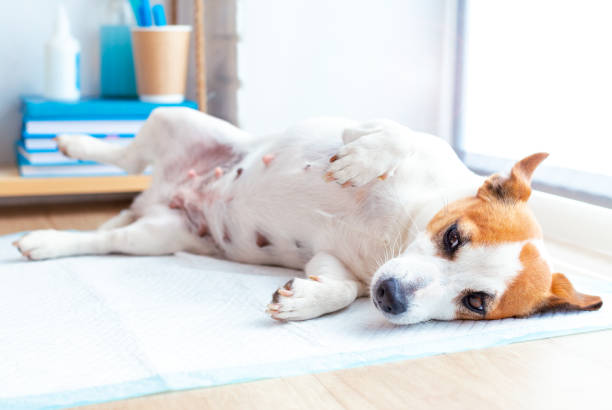
Neutering is a common surgical procedure that is performed on dogs to remove their reproductive organs. It is typically done to prevent unwanted litter, but it can also have other health benefits.
There is no one-size-fits-all answer to the question of when is it too late to neuter a dog. The best time to neuter a dog will vary depending on the individual dog’s age, breed, and health history.
Benefits of Neutering
There are many benefits to neutering a dog, including:
- Reduced risk of certain types of cancer. Neutering can help to reduce the risk of testicular cancer in male dogs and mammary cancer in female dogs.
- Reduced risk of unwanted behaviors. Neutering can help to reduce the risk of roaming, aggression, and marking behavior in male dogs.
- Can help to improve behavior. Neutering can sometimes help to improve behavior in male dogs, such as making them less aggressive or more trainable.
- Can help to prevent unwanted litter. If you do not plan on breeding your dog, neutering is the best way to prevent unwanted litters.
Risks of Neutering
There are also some risks associated with neutering a dog, including:
- Increased risk of obesity. Neutered dogs are more likely to become obese than intact dogs. This is because neutered dogs tend to be less active and have a slower metabolism.
- Increased risk of certain health problems. Neutered dogs are more likely to develop certain health problems, such as urinary incontinence and bone cancer.
- Potential complications from surgery. Any surgery carries some risk of complications, and neutering is no exception. However, the risks of complications are generally low.
When to Neuter a Dog
The best time to neuter a dog will vary depending on the individual dog’s age, breed, and health history. However, most veterinarians recommend neutering dogs before they reach sexual maturity. This is typically around 6 months of age for male dogs and 6-12 months of age for female dogs.
Neutering Older Dogs
It is not too late to neuter an older dog. However, there are some risks associated with neutering older dogs, such as an increased risk of anesthesia complications. Therefore, it is important to talk to your veterinarian about the risks and benefits of neutering an older dog before making a decision.
Conclusion
The decision of when to neuter a dog is a personal one. You should weigh the risks and benefits of neutering and make the decision that is best for your dog. If you are unsure about when to neuter your dog, talk to your veterinarian. They can help you make the best decision for your dog’s individual needs.
Here are some additional tips for neutering your dog:
- Choose a reputable veterinarian. Make sure your veterinarian is experienced in performing neutering surgery.
- Do your research. Learn about the risks and benefits of neutering before making a decision.
- Talk to your veterinarian. Discuss the risks and benefits of neutering with your veterinarian and make the decision that is best for your dog.
- Prepare for the surgery. Your veterinarian will give you instructions on how to prepare for the surgery.
- Aftercare is important. Follow your veterinarian’s instructions for aftercare to help your dog recover from the surgery.
By following these tips, you can help ensure that your dog has a safe and healthy neutering experience.
Frequently Asked Questions
Q: When is it too late to neuter a dog?
A: There is no definitive answer to this question. The best time to neuter a dog will vary depending on the individual dog’s age, breed, and health history. However, most veterinarians recommend neutering dogs before they reach sexual maturity. This is typically around 6 months of age for male dogs and 6-12 months of age for female dogs.
Q: What are the benefits of neutering a dog?
A: There are many benefits to neutering a dog, including:
- Reduced risk of certain types of cancer. Neutering can help to reduce the risk of testicular cancer in male dogs and mammary cancer in female dogs.
- Reduced risk of unwanted behaviors. Neutering can help to reduce the risk of roaming, aggression, and marking behavior in male dogs.
- Can help to improve behavior. Neutering can sometimes help to improve behavior in male dogs, such as making them less aggressive or more trainable.
- Can help to prevent unwanted litters. If you do not plan on breeding your dog, neutering is the best way to prevent unwanted litters.
Q: What are the risks of neutering a dog?
A: There are also some risks associated with neutering a dog, including:
- Increased risk of obesity. Neutered dogs are more likely to become obese than intact dogs. This is because neutered dogs tend to be less active and have a slower metabolism.
- Increased risk of certain health problems. Neutered dogs are more likely to develop certain health problems, such as urinary incontinence and bone cancer.
- Potential complications from surgery. Any surgery carries some risk of complications, and neutering is no exception. However, the risks of complications are generally low.
Q: What should I do to prepare for my dog’s neutering?
A: Here are some things you can do to prepare for your dog’s neutering:
- Choose a reputable veterinarian. Make sure your veterinarian is experienced in performing neutering surgery.
- Do your research. Learn about the risks and benefits of neutering before making a decision.
- Talk to your veterinarian. Discuss the risks and benefits of neutering with your veterinarian and make the decision that is best for your dog.
- Follow your veterinarian’s instructions for preparing for the surgery. This may include things like fasting your dog before the surgery and giving them medication to prevent nausea.
Q: What should I expect after my dog’s neutering?
A: Here are some things you can expect after your dog’s neutering:
- Your dog will be sore. Give your dog plenty of rest and pain medication as directed by your veterinarian.
- Your dog may have a small amount of bleeding. This is normal and should stop on its own.
- Your dog may have a bandage on their incision. This will need to be changed as directed by your veterinarian.
- Your dog may be more tired than usual. This is normal and should go away within a few days.
Q: What are some tips for caring for my dog after their neutering?
A: Here are some tips for caring for your dog after their neutering:
- Keep your dog calm and quiet. This will help to prevent them from licking or chewing their incision.
- Monitor your dog’s incision for signs of infection, such as redness, swelling, or discharge. If you see any of these signs, contact your veterinarian immediately.
- Give your dog plenty of rest. This will help their body heal properly.
- Follow your veterinarian’s instructions for feeding and medication. This will help to keep your dog comfortable and prevent any complications.
By following these tips, you can help your dog have a safe and healthy recovery from their neutering.
